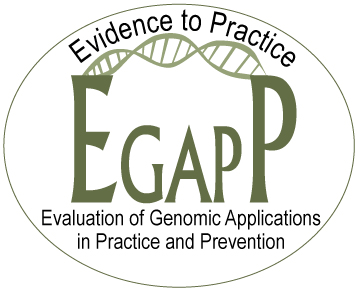Genomics and Precision Health Blog – Archive Posts
Public Health Genomics Highlights 2013

At the end of each year, we read about top lists of major events, accomplishments, and milestones. These lists are produced by journal editors, institutions and opinion leaders. CDC is no exception. In December 2013, CDC published its top 5 accomplishments for 2013, which include the Tips from former smokers campaign, outbreak investigations featuring pathogen Read More >
Posted on byGenome Sequencing in the Clinic – The question is not whether the glass is half-full or half-empty but whether or not the glass is the right tool.

Earlier this fall, the Blue Cross Blue Shield Technology Evaluation Center produced a report evaluating the clinical use of exome sequencing in the diagnosis of rare diseases. That this report was even generated is remarkable, as it marks an appreciable level of penetration by exome sequencing into clinical care. A decade ago, sequencing and interpreting even Read More >
Posted on byWhen Should We All Have Our Genomes Sequenced?

Recently, George Church, a prominent genomics researcher and leader of the Personal Genome Project asked why so few people are opting to inspect their genome. The cost and accuracy of genome sequencing have certainly improved dramatically. He clearly sees the health benefits of whole genome sequencing. He states “we should avoid being judgmental of people Read More >
Posted on by 2 CommentsPublic Health Genomics in Action: Reducing Morbidity and Mortality from Familial Hypercholesterolemia

In September, 2013, I participated in the International Familial Hypercholesterolemia (FH) Summit in Annapolis, Maryland. The event was sponsored by the FH Foundation, a patient-centered organization formed in 2011 to raise awareness about the condition and to develop actions for saving lives of patients and families with FH. The meeting brought together, from the US Read More >
Posted on byGenetic Epidemiology: What a Difference 20 Years Can Make!

In my introduction to the textbook ”Genetic Epidemiology: Methods and Applications” just published by Dr. Melissa Austin and colleagues, I commented on the remarkable evolution of the field in the 20 years since I wrote “Fundamentals of Genetic Epidemiology” with Drs. Bernice Cohen and Terri Beaty from Johns Hopkins University School of Public Health. Read More >
Posted on byPublic Health Impact of Genome-Wide Association Studies: Glass Half Full or Half Empty?

Genome-wide association studies (or GWAS) are large-scale genetic investigations of human disease that measure simultaneously hundreds of thousands of genetic variants scattered throughout the human genome. GWAS burst onto the scientific scene in the mid 2000’s. Propelled by technological advances and falling prices, GWAS have revolutionized the search for genetic influences on common diseases of Read More >
Posted on byWhy We Can’t Wait: A Public Health Approach to Health Disparities in Genomic Medicine

In May 2013, I attended and presented at the “Why We Can’t Wait Conference to Eliminate Health Disparities in Genomic Medicine.” The conference was organized by the University of Miami and Stanford University, with attendees and speakers from academia, consumer organizations, government agencies, public health, clinical practice, and the private sector. A key rationale for Read More >
Posted on byA Public Health Genomic State-by-State Clickable Map: Accelerating Implementation of Genomics Applications to Improve Population Health

In recent years, public health programs in several states have used innovative approaches to implement evidence-based genomic testing recommendations in an effort to improve health outcomes for people at increased hereditary risk for breast, ovarian, colorectal and other cancers. For example, the Michigan Department of Community Health [PDF 1.04 MB] has partnered with payers in Read More >
Posted on by 1 CommentNew Products from the EGAPP Working Group: Further Development of Evidence Review Methodology and More Recommendations in Genomic Medicine

The independent EGAPP working group (EWG) held its 27th meeting on May 13-14, 2013 via a virtual online venue. The EWG has been very active since the last meeting. Highlights included: The EWG has four new publications since the last meeting: Recommendations from the EGAPP Working Group: does genomic profiling to assess type 2 diabetes Read More >
Posted on byGenomes at CDC: Man, Mouse, and Microbe—it’s a Genomic World

The proposed Advanced Molecular Detection initiative aims to help CDC apply molecular sequencing and bioinformatics techniques to solving outbreaks and controlling infectious diseases. This approach has been called “genomic epidemiology”—using pathogen genome sequences to detect emerging diseases, assess their potential virulence and resistance to antibiotics, and monitor their spread in populations. The focus is on Read More >
Posted on by

